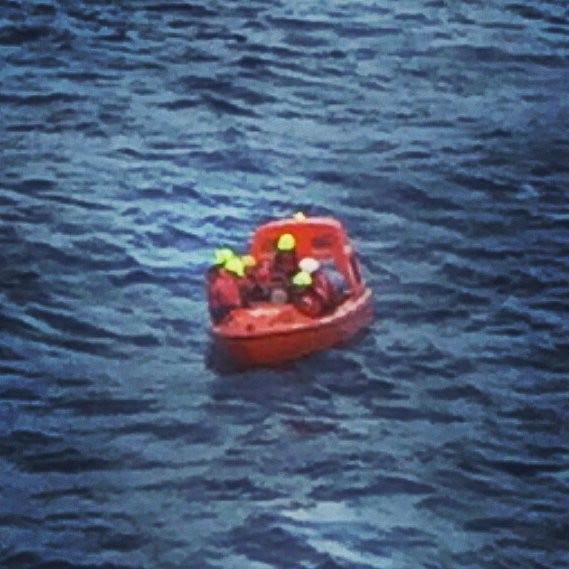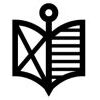I don’t feel much like writing this morning. Yesterday, I found out my best friend (the sterile 2nd Engineer Atheist from last week’s ferry trip, who was my best man at my wedding, and my closest friend through high school), has suffered a massive heart attack. At 38 years old, he was unconvinced by the clot shot, but severely distressed by the regulatory certainty of the great reset. Going through intense maritime training, while suffering paranoia, appears to have put his ticker over the edge. We don’t know what underlying issues assisted, but his wife did well to get him off the ship early. He had his cardiac arrest in hospital, so despite its severity, he is still with us.
Moments after hearing this news, as I tried to digest it a little, screams came from the front garden. Scott, get here now! My son and youngest daughter had been wrestling, and he bashed his head open on the doorstep. Blood poured and sprayed dramatically from the right-hand side of his head, and a cartoon-sized lump developed. I have kept about 50% of a ship’s medical chest in my house since the first lockdown, because I wanted to do everything to avoid the National Socialist Health Service during its’ greatest hour of need, as the third best funded (but definitely not best performing) healthcare system on earth. I patched him and checked for a concussion. It looked worse than it was, but for a moment, you just think, ‘what the hell man? This day.’
Earlier, at his fifth birthday party, we all had a great time. Except that I had the emotional unpleasantness of pretending everything was fine, despite knowing about my wife’s friend’s recent marital ‘difficulties’. My wife has spoken to her thus far, she has not confessed, but at least appears to have desisted in her ‘off target’ behaviour. For now.
We are monitoring with interest.
That cat did a lot more damage to my car than I realised. My living room ceiling still has a six-metre hole in it from when I ‘found’ the central heating pipes with a flooring screw in June. My bathroom is still as unfinished as my training courses.
Literally, as I was writing this, a leak came through the ceiling above me. Some unnamed child or unknown event has cracked the cistern of our en-suite bathroom. Water is splashing on my laptop now, and I take a short break to wet-vac it out and shut off the water to it.
What to do?
Be grateful for wet-vacs (thank you Mr Karcher), and the fact I already have a plumber coming for the week. Play hide and seek with the toddler. Hug your kids and wife as much as possible. Pray for the atheist, even though he’ll hate that. Call his wife every day, and visit when I’m allowed.
Theodore Atkinson wrote about the hero’s journey this week, in his Stack, Theodore’s newsletter:
The hero’s journey is summarized as:
1. Ego death;
2. Confronting the darkness;
3. Divine rebirth.
Now, imagine its opposite.
1. Divine death;
2. Occulting the darkness;
3. Ego rebirth.
That is the anti-hero’s journey. – Many on the anti-hero’s journey mistake theirs as the path of righteousness.
Theodore, whose name means God’s gift, has served us up a little gem there. An invitation to consider one’s actions in the here and now, as the little steps taken along the path towards the ultimate judgement of our lives.
I don’t know every step between here and there. I can only see a couple of moves ahead. But I know for sure what I’m serious about. There are some things that need to be changed in this world.
Enter at the darkest part of the forest, the diamond is in the rough, the devil is in the detail, and great truth may be found in filth.
Sorry, this post isn’t longer. I have to go toilet shopping again. And then update my websites.
In other news, I’ve started populating a Picfair store. So far it’s mostly my Instagram images from the blog, but I plan to add photography from about 20 years at sea, over the coming months. All phots are available for commercial license, and printing. Contact for any originals, if required:
I’ll leave you with some filler from an old LinkedIn article I did a while ago when I first came ashore in 2015:
Before coming ashore, I spent a few trips sailing as Chief Mate. That involves being second in command of the ship, but on a supply vessel, you are in fact in charge of the ship’s operations for about 12 hours a day. Driving your £50-Million ship, with £100-Million cargo, up to a £500-Million oil rig, in a Force 5 sea, and trying to do liquid, dry bulk and deck cargo without killing anyone is exactly as hard as it sounds. It was great fun. I was also now responsible for procurement, budgets, and maintenance on board, I was now the ship’s medical officer, and in charge of firefighting, training, and all manner of other activities on board.
On my second last trip, I lead the rescue of 3 men from a sinking boat, in the Northern North Sea. In the middle of cargo operations alongside an oil rig, I spotted a rescue vessel that appeared to be foundering. We offered them assistance, and initially, they refused it. However, their boat started taking on water much faster than they were comfortable with, and they did then ask for our help.
I called the Master to take over the control of the ship and then took my Second Officer and a Sailor to our Rescue Boat. It was a life-changing experience. I had never used our rescue boat before, and neither had any of my crew. Every possible mistake that we could make, we made. It was like an episode of the Chuckle Brothers or the Three Stooges. We failed to start the engine, couldn’t get the boat off the hook, timed it wrong and got thrown around in the 4m swell, which was now building. A few curse words and some perseverance got us through it, and we managed to find the boat which had now drifted away. When we got there, it had almost entirely sunk, and the three men were standing on the bow of the boat, which was all that was left above water. It would sink completely, just a short time later.

Those men jumped onto our boat, and we managed to get back to our ship, feeling quite relieved. It took us a full 2 hours to get them back on board our mother ship, and recover our own boat, due to the difficulties of operating in proximity to a larger ship, in worsening sea conditions, alongside an oil rig.
That experience was everything I had hoped to achieve in my career at sea. I made a real, tangible difference to those men and their families. I had overcome my own fears and self-doubt. I had taken responsibility and willingly faced a challenge that previously I never could have imagined. By getting in that rescue boat, I had willingly faced a serious physical and mental challenge. I think that is what I always wanted from my career at sea. I had done something real.
We didn’t get any medals for it. We didn’t get any reward. Nobody made a big deal about it. It was just a simple rescue. Part of the job. Expected.
When we got back to port a few days later, those men just went back to work on their ship of origin. And that pretty much sums up the Merchant Navy. It may lack the glamour, and the parades and the ceremony of the Royal Navy, that I initially found so seductive. Instead, the Merchant Navy is humble and quiet, and understated.
And that is what I take pride in now, as a Merchant Navy Officer. The fact is that there are over 7 Billion people alive today on this earth, primarily because they can make a living based on trade. 90% of all food and goods are transported by sea. Since 2004 the cargo-carrying capacity of the world merchant fleet has doubled, and the number of people living in absolute poverty has halved at the same time. The material progress of the entire human species is founded on the humble service of merchant seafarers. You never hear about them unless there is some disaster, but they are always out there. 24/7. Marine adventurers, traversing the last great wilderness on earth, the oceans.
Raul Armesto said it best when he wrote; “The world isn’t interested in the storms you encountered, but whether or not you brought in the ship”.
I think that is right. Being in the Merchant Navy teaches you many skills. Attention to detail, problem-solving, and hard work are undoubtedly the primary attributes you must develop to have success in a career at sea. But the defining qualities of the Merchant Navy, more than any other profession I am aware of, are humility and trustworthiness. And those are some things I am very grateful to have learned in my time at sea.
Start writing today. Use the button below to create your Substack and connect your publication with Captain Yankee Jock
